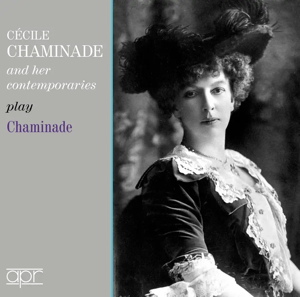
Cécile Chaminade (1857-1944)
Cécile Chaminade and her contemporaries play Chaminade
rec. 1901-1950
APR 5647 [82]
Cécile Chaminade’s November 1901 recording session has been reissued before on APR 5533, as volume 3 of their ‘Piano G & T’ series. I don’t believe it was reviewed here though other volumes were. Now those seven recordings return in this disc, with the first two sides being heard in rather better copies, and her recordings have been cleverly recontextualised by adding discs made by many pianists, mostly British-based, who also recorded Chaminade’s music in the years 1912 to 1930. There’s a single post-war exception in the case of Shura Cherkassky’s recording of Autrefois.
Chaminade only performed her own music in recitals and so her visit to the London studio gives us some strong pointers as to how she wanted her music to be taken. Sonically compromised though they may be, by the standards prevailing at the time in Paris, with its wobbly recording turntable, these seven sides are fine examples of engineer Fred Gaisberg’s artfulness in the studio. One can hear him from time to time telling Chaminade to ‘Go!’ and muttering a few other instructions which I found impossible to decipher – these things are part of the fun of early recordings. Her playing is buoyant and rhythmically alive, and her quotient of chic wit is always on show. Just listen to the way she drolly dispatches Pierette, Air de Ballet, Op.41, for instance. There is a missing matrix which was never released and may have contained one of her most popular pieces, Automne, Op.35 No.2, which we later hear Mark Hambourg play in 1930.
The other pianists perform at least one version of every work recorded on 78s. Lilian Bryant was a rather protean figure in the fledgling recording studios not only as performer but also as conductor, arranger and musical director. Her fluent recording of the Toccata dates from 1912. There are five acoustic and four electric recordings from Una Bourne, a ubiquitous figure in the HMV studios during those years. APR has released a twofer of her recordings and none of the Chaminade discs here duplicates any presented there. Her acoustics in the disc under review are inclined to be under-characterised and glib. She has the digital control but not always the sense of line or instinct for phrasing. The Interlude, Op.152 is a case in point. It’s marked ‘Andante tranquillo’ and ‘Dolce’ in the first bars but Bourne tramples it underfoot. Her electric recordings are tonally warmer and rather better.
Each of the selected pianists brings something to this rhythmically varied repertoire, with its desire to please and entertain, and its capricious wit. William Murdoch is amongst the best-known and he has also been represented by APR of late (review). Whilst he’s not quite as snappy as the composer, his 1917 version of Danse créole (2nd Havanaise), Op.94 offers a far more complete and astute performance than Bourne manages at around the same time – more colouristic, more considered and more sensitive. Little-known Gertrude Meller’s Air de Ballet is full of liveliness but is a bit skittish. She recorded quite heavily for Homochord and as the excellent notes, from Jeremy Nicholas suggest, it would be good to hear more of her discs. Marie Novello could have had an important career had she not died at 44 of throat cancer and she’s another worthwhile candidate for remastering. There’s a typo in the booklet which has her date of birth as 1898 but it was actually 1884. Max Darewski is an efficient practitioner and his recording of Arlequine was the only one to be made on 78 through young Maurice Cole, then 22, and the first pianist to give a recital on the BBC, proves more convincing in the Scherzo in C major. Rudolph Ganz and Hans Barth are both represented by one, American-recorded side apiece. Hambourg is excitable in the central section of Automne and the disc ends with Cherkassky deftly evoking French harpsichordists of old in Autrefois, an Abbey Road recording made in June 1950.
The transfers were carried out by Andrew Hallifax except the British Library transfers which were transferred by Karl Jenkins. I don’t think APR makes it clear who did what but in any case, a superior job has been accomplished. This lively and entertaining disc makes clear that Chaminade’s spell lasted for several decades after her own recordings and though interest abruptly stopped, the pendulum’s swing has ensured that we can listen to modern recordings of her music now buttressed by those of pianists of old. These performances still have much to teach.
Jonathan Woolf
Buying this recording via a link below generates revenue for MWI, which helps the site remain free.


Contents
Air de Ballet, Op.30
Pas des éscharpes (Scarf Dance) from Callirhoë, Op.37
Courante; No.3 from Trois Danses anciennes, Op.95
Les sylvains, Op.60
Danse créole (2nd Havanaise), Op.94
Pierrette – Air de Ballet, Op.41
La lisonjera, Op.50
Cécile Chaminade (piano), rec. November 1901
Toccata, Op.39
Lilian Bryant (piano), rec. 1912
Valse caprice, Op.33
Air de Ballet from Callirhoë, Op.37
Étude romantique, Op.132
Quatrième valse, Op.91
Interlude, Op.152
Una Bourne (piano) rec. 1914-16
Danse créole (2nd Havanaise), Op.94
Sérénade in D major, Op.29
William Murdoch (piano), rec. 1917
Pas des éscharpes (Scarf Dance) from Callirhoë, Op.37
Rudolph Ganz (piano) rec. 1918
Air de Ballet, Op.30
Gertrude Meller (piano), rec.1922
Pas des Amphores from Callirhoë, Op.37
Marie Novello (piano), rec. 1923
Fileuse, No.3 from Études de concert, Op.35
Arlequine, Op.53
Max Darewski (piano), rec. 1923-24
Scherzo in C major, Op.35 No.1
Maurice Cole (piano), rec. September 1925
Aubade, Op.140
Valse-Arabesque, No.4 from Feuillets d’album, Op.98
Nocturne, Op.165
Berceuse arabe, Op.166
Una Bourne (piano), rec. 1925-28
La lisonjera, Op.50
Hans Barth (piano), rec. November 1926
Automne, Op.35 No.2
Mark Hambourg (piano), rec. September 1930
Autrefois, No.4 from Pièces humoristiques, Op.87
Shura Cherkassky (piano), rec. June 1950

















